Ed Gorman's Blog, page 177
December 14, 2011
What do Isaac Asimov, Robert Bloch, Harlan Ellison. James Gunn, Jack Vance, and Donald Westlake have in common?
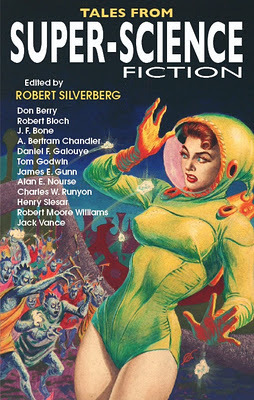
Ed here: For people like Bill Crider and me the announcement that follows is like the pearly gates opening up. There was no other sf mag like Super-Science Fiction. Scoffers might say that no other sf mag WANTED to be like Super-Science but if you were the right pimply age no other mag provided the same thrills. The copy below tells you all about it. Once again the great Haffner Press comes through.
Tales From Super-Science Fiction
Edited by Robert Silverberg
Illustrated by Frank Kelly Freas & Ed Emshwiller
ISBN: 9781893887480
$30.00
400+ pp. Hardcover
Color endpapers
(coming soon)
Description
Robert Silverberg has assembled a collection of 14 stories from Super-Science Fiction. S-SF was launched during the sf boom of the mid-1950s. Paying a princely rate of 2 cents a word the magazine attracted fiction by Isaac Asimov, Robert Bloch, Harlan Ellison. James Gunn, Jack Vance, and Donald Westlake, and featured cover art by Frank Kelly Freas and Ed Emshwiller. Running for 18 bi-monthly issues (Dec '55 to Oct '59), the magazine eventually devolved into a publication capitalizing on the then-current craze of "monster" stories.
Editor Silverberg traces the genesis of Super-Science Fiction from it's beginnings as an outlet for numerous colonization/expedition stories to its conclusion with such stories as "Creatures of the Green Slime," "Beasts of Nightmare Horror" and "Vampires from Outer Space." It's fun, it's cheesy, and we're really looking forward to it!
Table of Contents
Reviews
Excerpts
Table of Contents
Introduction by Robert Silverberg
"Catch 'Em All Alive" by Robert Silverberg
"Who Am I?" by Henry Slesar
"Every Day is Christmas" by James E. Gunn
"I'll Take Over" by A.Bertram Chandler
"Song of the Axe" by Don Berry
"Broomstick Ride" by Robert Bloch
"Worlds of Origin" by Jack Vance
"The Tool of Creation" by J.F. Bone
"I Want to Go Home" by Robert Moore Williams
"Hostile Life-Form" by Daniel L. Galouye
"The Gift of Numbers" by Alan E. Nourse
"First Man in a Satellite" by Charles W. Runyon
"A Place Beyond the Stars" by Tom Godwin
"The Loathsome Beasts" by Dan Malcolm (aka Silverberg)
Published on December 14, 2011 12:51
December 13, 2011
Pete Enfantino-A Tribute To Robert Colby
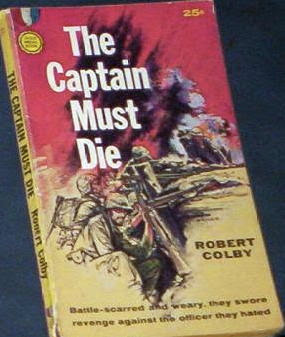
Ed Gorman: When Robert Colby died my friend Pete Enfantino wrote a fine piece about Bob, who was a gentleman of the old school and a damned fine human being as well as a damned fine writer. After reading The Captain Must Die again for the twenty fifth time or thereabouts (I read it when it came out and have been reading it over and over ever since) I decided to read Pete's piece again. It's a good one.
ROBERT COLBY - A TRIBUTE by Peter Enfantino
Robert Colby died last week. A lot of people won't even recognize the name. That's a shame, but it's their loss. Colby was every bit as good a writer as the other Gold Medal authors of the 50s and 60s who've found favor among historians and collectors. He just never had one of those million sellers like the other guys did. There was no Death of a Citizen or Hill Girl. Just respectable sales for some of his "adult" titles like Lament for Julie (Monarch, 1961) and Executive Wife (Monarch, 1964).
My introduction to Robert Colby, as was my introduction to all the classic Gold medal authors, was through an article Ed Gorman wrote for a magazine I used to co-publish called The Scream Factory. In the piece Ed sang the praises of a couple dozen GM authors, writers such as Peter Rabe, Vin Packer, Gil Brewer, Wade Miller, and Harry Whittington. Back in 1993, (when the article first appeared) Black Lizard was publishing a lot of forgotten writers like Packer, Rabe, and Brewer, so I was fairly familiar with those guys. One of the writers Ed praised was Robert Colby, a name I was not so familiar with. Ed called Colby's The Captain Must Die (Gold Medal, 1959) "one of the great GM novels," so I knew I had to check this one out.
Because of Ed's article, I had a long grocery list when I hit Tom Lesser's annual Paperback Show (a must for pb collectors, by the way) in Mission Hills that following April. There I found plenty of the recommended reading, including The Captain Must Die (in a quarter box, no less) and two other Colbys: The Star Trap and Murder Times Five. The latter two were decent reads, but Ed was right on in his assessment that Captain was a must. It's a nasty revenge tale that holds its own with the best "nasty revenge tales" that Gold Medal excelled in and could have been made into a nice, tight little 50s noir had the movie deal not fallen through.
for the rest go here: http://www.mysteryfile.com/Colby/Trib...
Published on December 13, 2011 18:32
December 12, 2011
George Clooney Producing Smothers Brothers Movie -- NPH as Tommy Smothers?
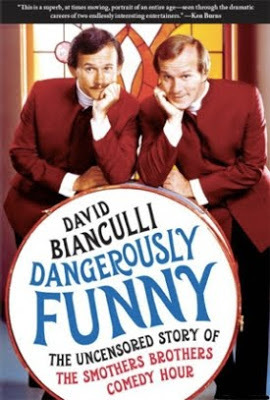
FROM THE WRAP
George Clooney Producing Smothers Brothers Movie -- NPH as Tommy Smothers?
Published: December 12, 2011 @ 7:50 am
By Kimberly Potts
Oscar winner George Clooney -- a current awards season favorite with "The Descendants" -- has added another project to his packed upcoming movie slate: Clooney and Smokehouse Pictures partner Grant Heslov will produce a movie about the Smothers Brothers and their groundbreaking TV series.
Clooney and Heslov are teaming with Sony to turn David Bianculli's 2009 book "Dangerously Funny: The Uncensored Story of 'The Smothers Brothers Comedy Hour'" into a film.
Bianculli confirmed the project on his site, TV Worth Watching. He called Clooney his dream choice for the movie adaptation of his book about the Smothers and their 1967-69 variety hour series.
His dream casting choice? Neil Patrick Harris as Tommy Smothers.
Read more: Clooney Tells Berlusconi Over Sex Trial: Do I Know You?
"The Smothers Brothers Comedy Hour" -- which counted Steve Martin and Rob Reiner among its writers -- drew the ire of CBS censors by including social commentary about the Vietnam War and politicians. It was cancelled by the network in 1969.
"First, I'm thrilled on behalf of Tom and Dick, whose story deserves to be told and retold, and whose efforts to inject topicality into scripted TV comedy in the 1960s led very directly to the sort of thing Jon Stewart, Stephen Colbert and Bill Maher are doing today," Bianculli wrote.
"But I'm also thrilled because, when the book was still in galleys and I was asked by the film-division agent at my literacy agency to name my dream filmmaker for a Smothers Brothers movie, I said two words. One was George. The other was Clooney."
Read more: Hugh Jackman Shows Conan How to Be Like George Clooney (Video)
Bianculli, a TV critic and Rowan University professor, said he uses Clooney's Oscar-winning film "Good Night, and Good Luck," and live remake of "Fail Safe," in his courses.
Brian Hecker and Craig Sherman will write the screenplay for the Smothers movie. They are also co-writing "Atari," a biopic about Atari founder Nolan Bushnell.
Published on December 12, 2011 12:51
December 11, 2011
Bill Pronzini on Elilott Chaze
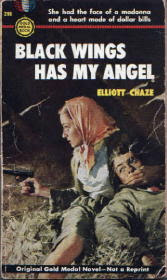
Ed here: Bill Pronzini's contributions to the genre of crime fiction have been enormous. First he created the groundbreaking Nameless series (stronger than ever) second he wrote numerous stand-alones and stories that have won praise and awards world-wide and third he has compiled a body of excellent literary biography and criticism that needs to be collected and published. Here is an example from Mystery*File.
ON ELLIOTT CHAZE
by Bill Pronzini
Elliott Chaze (1915-1990) was an old-school newspaperman who began his journalism career with the New Orleans Bureau of the Associated Press shortly before Pearl Harbor, worked for a time for AP's Denver office after paratrooper service in WW II, and then migrated south to Mississippi where he spent twenty years as reporter and award-winning columnist and ten years as city editor with the Hattiesburg American.
In his spare time he wrote articles and short stories for The New Yorker, Redbook, Collier's, Cosmopolitan, and other magazines, and all too infrequently, a novel. In an interview he once stated that his motivation in writing fiction, "if there is any discernible, is probably ego and fear of mathematics, with overtones of money. Primarily I have a simple desire to shine my ass — to show off a bit in print."
His first two novels were literary mainstream. The Stainless Steel Kimono (Simon & Schuster, 1947), a post-war tale about a group of American paratroopers in Japan, was a modest bestseller and an avowed favorite of Ernest Hemingway.
The Golden Tag (Simon & Schuster, 1950), like most of his long works, has a newspaper background, contains a good deal of autobiography, and is both funny and poignant; it concerns a young wire service reporter and would-be novelist in New Orleans who becomes involved with two women, one of them married, while reporting on a sensational murder case.
His third novel was the one for which he is best remembered today, Black Wings Has My Angel (Gold Medal, 1953; also published as One for My Money, Berkley, 1962 and as One for the Money, Robert Hale, 1985).
for the rest go here:http://mysteryfile.com/blog/?p=142
Published on December 11, 2011 09:01
December 10, 2011
BEHIND THE BATES MOTEL: Robert Bloch
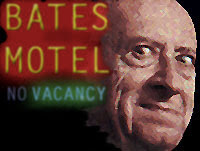
Ed here: I've been reading a collection of Robert Bloch's stories this week and remembered a fine piece about Bloch written by the always entertaining and insightful Paula Guran.
BEHIND THE BATES MOTEL: Robert Bloch
August 1999
By Paula Guran
"PSYCHO all came from Robert Bloch's book." -- Alfred Hitchcock
With the current centennial of Alfred Hitchcock's birth being noted with various events and symposia, I can't help but observe that PSYCHO -- the most notorious and perhaps best known of all of Hitchcock's films -- was adapted from a novel of the same name by Robert Bloch. As Douglas E. Winter put it in his 1985 FACES OF FEAR, "Two masters of horror have been immortalized by the motion picture PSYCHO...One, of course, is its director, Alfred Hitchcock; the other is the man who wrote the novel on which it is based. And no one ever said it better than Hitchcock himself: 'PSYCHO all came from Robert Bloch's book.'"
Before his death in 1994 at age 77, Bloch often joked that his obituary would begin with PSYCHO, a novel that was just a tiny part of his flood of work. Of course, he was right. And, although Mr. Bloch might disagree, perhaps that's the way it should be. PSYCHO, both the film and the book, had a resounding effect on both literary and cinematic horror. Quoting Winter again, "From the Depression heyday of WEIRD TALES and the evocative Universal film adaptations of FRANKENSTEIN and DRACULA, the tale of terror had suffered until the mid-1950s, as if the real horrors of World War Two had snuffed out the human need for fictional confrontation with death. Not until the Eisenhower era did the monsters reemerge in force: first in the innocuous science-fictional context of the "big bug" films, then in the exuberant American International youth films like I WAS A TEENAGE WEREWOLF (1957), and finally in the serious context of films and books like PSYCHO."
PSYCHO, however, was not Bloch's first or last exploration of psychopathology or the only way in which he influenced modern horror fiction.
fo the rest go here: http://www.darkecho.com/darkecho/horr...
Published on December 10, 2011 13:07
December 9, 2011
Pro-File: Tony Richards
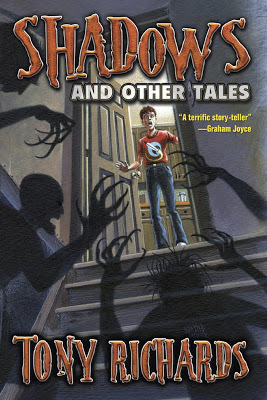
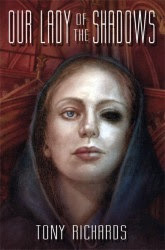
Here are two collections of stories from Dark Regions Press that should become staples for readers (and writers) of dark suspense and horror fiction. Tony Richards has been writing some of the most unique and most disturbing fiction since the 1980s when the horror boom was still going strong.
Our Lady of Shadows emphasizes the kind of ghost stories that will linger with you long after you close the book, stories that manage to be both chilling and thoughtful. One of Tony's strengths as a writer is to put his people in terrifying situations and increase their desperation page by page.
Shadows and Other Tales offers a wide range of horrorific and dark suspense themes, tropes and creative twists. Tony's take on various modern dilemmas, physical and emotional, power these stories. As always the tales are both page turners and intelligent commentaries on the dark sides of life today.
Here's an interesting and entertaining Pro-Fie with Tony Richards.
Q&A with ED GORMAN
Q1/ Tell us about your current novel or project.
A1/ I have two major books on the go at the moment. The first is another short story collection that I've just put together. The title is 'Summertime: The Best SF of Tony Richards.' I realize that I'm better known as a horror and supernatural author, but I've been penning the occasional SF tale for over three decades, and these are my favorites. The collection includes two novelettes that first appeared in Asimov's in the Eighties, plus a story -- from an old British magazine called Ad Astra -- that first saw print in 1979. The complete book is with Dark Regions Press at the moment, and hopefully they'll publish it in 2012.
The second is the one I'm working on right now, and it's a new Raine's Landing novel. And in case your readers do not know, I'll explain the premise behind the series. The idea is that there were real witches in Salem, Massachusetts. Clever and prescient, they fled that town before the infamous Trials of 1792 began. They decamped to the town of Raine's Landing instead, and the place has been full of magic and strangeness ever since. Except there are a couple of small problems. Because of the nature of the Landing, supernatural badness is attracted there like iron filings to a magnet. And the town is affected by a curse -- nobody born there can ever leave.
The chief protagonist -- the town's main troubleshooter -- is a man called Ross Devries, a former cop who's lost his family to magic gone badly wrong. He never uses the stuff himself, partially because of that, but he has several people who help him, not least a gun-toting young woman -- formerly a criminal -- name of Cassie Mallory. The first two books -- 'Dark Rain' and 'Night of Demons' -- were brought out by HarperCollins. And the third -- 'Midnight's Angels' -- has recently been released by Dark Regions. They've had brilliant reviews and attracted a following, but they haven't made the big time yet. Although I've had a couple of tentative approaches from movie and TV people, so who knows?
Q2/ Can you give us a sense of what you're working on now?
A2/ The new Raine's Landing novel is called 'Speak of the Devil,' and it's something of a departure from the earlier books. In the first few novels, the supernatural menace came from outside the town. This time, it's a small group of townsfolk trying to take power by means of the darker arts. And because of that -- because it's his own neighbors -- Ross finds what's going on much harder to deal with. Additionally, he doesn't have Cassie with him for most of the book … she is pregnant, and has been hospitalized. That's something I'm very much trying to do with this series, have things happen to the characters that are outside the main story arc, have them go through setbacks and events that change them, just like people in the real world.
In the earlier books, as well, the threats mainly came from inhuman, or barely human, sources. Whereas in 'Speak of the Devil,' I'm dealing with human evil, including one bad guy who's so innately vicious he makes Hannibal Lecter look like Jimmy Stewart. It's been tremendous fun writing about him.
Q3/ What is the greatest pleasure of a writing career?
A3/ I've seen more than a hundred short stories in print, two stand-alone novellas, five novels and six collections. And after all this time, I still get a tremendous buzz when something new comes out with my name on it, particularly when it comes with a great cover like the ones Wayne Miller has been doing for my books over at DRP. I'm definitely not someone who writes stuff just to put it away in a drawer … I like to see my work out there and being read. And hearing back from readers -- and the Raine's Landing novels have generated a good few enthusiastic emails -- is always a pleasure.
On that subject, I've in recent years derived a great deal of satisfaction from giving public readings of my work. I was nervous as all hell the first time that I did it, but have begun to genuinely enjoy it since. Writing is mostly a very isolated job, and I've no particular problem with that. I'd hate to try and write with people looking over my shoulder and going "You spelt that wrong" or "Ooh, what happens next?" But it's nice to get out there into the world beyond my head sometimes, and giving a reading let's you connect with your audience on a very direct level.
Q4/ The greatest displeasure?
A4/ Most writers I've ever spoken to agree on this one. I've no problem at all with polishing up a short story, but rewriting a full-sized novel is largely drudgery, an enervating slog with very little that is joyful or creative to it. But it has to be done and, since I'm something of a perfectionist, it usually gets done at least four times, often more, before I'm happy with a finished book. All that you can do is tuck your head down and get on with it, looking forward to the day you reach the final page and can start on something new again, the fresh creative juices flowing.
Q5/ Advice to the publishing world?
A5/ Publishing's a business, sure, and the houses have to either make money or go broke and wind up publishing no one. A smart writer understands that and does not whine on about 'commercialism.' But the plain fact of the matter is, far too many publishers don't conduct themselves in much of a businesslike way. I'm constantly hearing from writer friends who were told that this and that publicity was going to happen and it never did. I even know one woman whose novel got turned into a TV miniseries, starring a well-known actor … and her publishers never even bothered to tie it in. So my advice to publishers would be, 'be better, smarter businessmen and do more for your authors -- you will sell more books.'
Q6/ Are there any forgotten writers you'd like to see in print again?
A6/ The thing that's really changing this -- bringing authors back -- is not print but ebooks, although it is a slow process. I was horrified to see that, until recently, there was barely any Bradbury on Kindle, except that's changing with the re-publication of Fahrenheit 451.
One series that I used to love, and do not see around much any more, was Peter O'Donnell's Modesty Blaise novels. She's a secret agent, and the books are kind of distaff James Bond stuff. But they're considerably better written than you would expect, with good characters and exciting plots.
When I was a kid, there used to be an English series -- written, if I recall, by different authors -- about a detective called Sexton Blake, a rather more down-to-earth version of Sherlock Holmes. That could stand revisiting.
How many people these days know about Joan Aiken's Wolves of Willoughby Chase books? They're ostensibly fantasies for older children, but are wonderfully imaginative and so beautifully told that any adult can enjoy them, and they've invited praise from the likes of Michael Moorcock.
And when it comes to science fiction, did I hear someone mention Cordwainer Smith, who wrote some truly amazing stories such as 'Scanners Live in Vain'?
Q7/ Tell us about selling your first novel?
A7/ It was called 'The Harvest Bride,' and was a supernatural thriller about an alcoholic American journalist, currently living in London, England, who finds his colleagues being murdered and starts linking those crimes to the time they spent in Vietnam, covering the war there. I wrote it on a big blue Olivetti manual typewriter that I still keep tucked away in a closet in my study. And because you could not delete and alter anything you wanted, writing was a rather different process back then. You had to go at your prose rather more carefully the first time around. In fact, I finished 'The Harvest Bride' in two drafts. (The following year I bought my very first word-processor, and my next novel -- 'Night Feast' -- went through seven, which demonstrates how that kind of technology has changed the way we work).
I then went looking for an agent, and Leslie Gardner, a native Manhattanite who now lives in London as well, picked me up. She showed the novel to Tor, and they bought it straight off. Huge joy in the Richards household, as you can imagine. Headline Books took the rights for the British market. It went on to be nominated for the HWA Bram Stoker Award for Best First Novel, alongside Clive Barker's and Dan Simmons' debut books. And it got some wonderful reviews, including one from a certain E. Gorman, which is why I'm so pleased to be appearing on this blog. Huge thanks, Ed.
Published on December 09, 2011 13:38
December 8, 2011
Forgotten Books: Fake I.D. by Jason Starr
Jason Starr is the poet of pathological lives. In Fake I.D. he gives us Tony Russo, gambling addict and bartender/actor, who believes, despite enormous evidence to the contrary, that someday real soon now he will reap a bonanza with his gambling just as he knows that he will soon enough be King of Hollywood. Gold at the track and movie star pussy forever.
One of the ways he hopes to hurry his dreams along is by stealing ten thousand dollars from the bar where he works. He has a chance to buy a share of a race horse and thus become a (another fantasy) a gentleman of the horsey set (his daydream about standing in the winner's circle with a movie star lady practically going down on him is especially embarrassing and pathetic). But being the good businessman he is he takes the ten grand and goes to Vegas where he is real real sure he will play this into much much more. He returns home broke of course.
Being a good sociopath Tony must now replace the money he lost in Vegas. This quest, and it is nothing less, involves more stealing and not incidentally murder. Starr gives us a trio of women who become indelible in the reader's mind. My favorite is Janene. Like Frank, the man who owns the bar where Tony works, she is sensible, intelligent and honest. It is from her that he lifts jewelry.
Starr has one of those quintessential New York voices. Because Richard Price's Ladies' Man is one of my favorite novels I kept hearing riffs on that in this book especially when Starr was writing about the bar and the people who work there and hang out there. Starr has an almost surreal eye and ear for manners and he can be both witty and chilling at the same time. He's excellent with boozy conversation.
Starr is on record acknowledging his debt to certain of the paperbacks of the 1950s and 1960s and the pace and punch of his novel certainly demonstrate that affection especially when all of Tony's sweaty plans begun to unravel. But the book is wholly Starr's and it's a sound strong good one. So many writers try hard to replicate Jim Thompson by using similar material. Tony Russo's heart is as dark as any of Thomson's sociopaths but his environment and his style could not be more disimilar. Lew Ford wouldn't know what to make of him.
Because of his social eye and because of his ambition to include the wider world in his work, Jason Starr is among my favorites of the neo-noir writers. Fake I.D. is a gem of treachery.
One of the ways he hopes to hurry his dreams along is by stealing ten thousand dollars from the bar where he works. He has a chance to buy a share of a race horse and thus become a (another fantasy) a gentleman of the horsey set (his daydream about standing in the winner's circle with a movie star lady practically going down on him is especially embarrassing and pathetic). But being the good businessman he is he takes the ten grand and goes to Vegas where he is real real sure he will play this into much much more. He returns home broke of course.
Being a good sociopath Tony must now replace the money he lost in Vegas. This quest, and it is nothing less, involves more stealing and not incidentally murder. Starr gives us a trio of women who become indelible in the reader's mind. My favorite is Janene. Like Frank, the man who owns the bar where Tony works, she is sensible, intelligent and honest. It is from her that he lifts jewelry.
Starr has one of those quintessential New York voices. Because Richard Price's Ladies' Man is one of my favorite novels I kept hearing riffs on that in this book especially when Starr was writing about the bar and the people who work there and hang out there. Starr has an almost surreal eye and ear for manners and he can be both witty and chilling at the same time. He's excellent with boozy conversation.
Starr is on record acknowledging his debt to certain of the paperbacks of the 1950s and 1960s and the pace and punch of his novel certainly demonstrate that affection especially when all of Tony's sweaty plans begun to unravel. But the book is wholly Starr's and it's a sound strong good one. So many writers try hard to replicate Jim Thompson by using similar material. Tony Russo's heart is as dark as any of Thomson's sociopaths but his environment and his style could not be more disimilar. Lew Ford wouldn't know what to make of him.
Because of his social eye and because of his ambition to include the wider world in his work, Jason Starr is among my favorites of the neo-noir writers. Fake I.D. is a gem of treachery.
Published on December 08, 2011 08:56
December 6, 2011
Sara Paretsky discusses Alfred Hitchcock's Vertigo
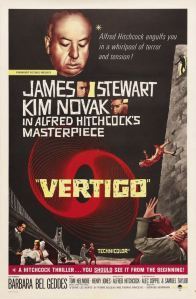
On Watching Vertigo on the Big Screen in 35mm with an Audience
Posted by suzidoll on December 5, 2011 FROM TCM MOVIE MORLOCKS
On a cold, blustery Chicago afternoon, I was safely tucked in the back row of a theater watching Vertigo as it was intended to be seen—on the big screen in 35mm with a theater full of movie buffs, cinephiles, and Hitchcock fans. The rich, saturated colors of the new print were a treat after seeing so many contemporary films shot in the drab, flat, burnished colors of digital cinematography. The film was followed by a commentary and discussion led by mystery writer Sara Paretsky and psychologist James W. Anderson, a professor at Northwestern University. Watching Vertigo on the big screen helped me notice details that had eluded me on previous viewings, while comments by Paretsky and Anderson offered a different point of view on the film. I also learned a great deal from the insightful observations of the audience members.
Part detective story and part psychological thriller, Vertigo is about a man who cannot come to grips with his obsession for a woman. And, it is also the story of what it means for the woman to be the object of that obsession, though that part of the tale is often overlooked. Hitchcock was fond using a doppelganger theme in his films, in which one of the main characters has a double who is exactly like them and yet the opposite of them. A doppelganger theme often employs a doubling structure in the narrative; in other words, patterns or events are repeated twice. With this viewing of Vertigo, I noticed that the doubling structure for this film consists of the real version of a character or event juxtaposed with a phony version. Kim Novak is introduced as Madeleine Elster, but she is really Judy Barton who is masquerading as Madeleine as part of an elaborate murder plot. The phony Madeleine pretends to be obsessed with her great grandmother, Carlotta Valdes. Jimmy Stewart is John "Scottie" Ferguson, who is hired by Gavin Elster to follow his "wife" to learn more about her obsession. Scottie is the dupe in the plot who will ensure that Elster's plan is successful. In pretending to be obsessed, Madeleine visits places associated with her ancestor, including the graveyard where Carlotta is buried and the museum where her portrait hangs. Scottie's desire for the phony Madeleine, especially after her death, turns into a real obsession, which is manifested through his haunting of the same places—her gravesite, the museum, etc. We see Scottie follow Madeleine to these places in the first half of the film as part of her pretense; then we see him haunt these places in the second half of the movie as part of his real obsession. While recovering from his breakdown, Scottie runs into the real Judy, whom he tries to recreate into the Madeleine who never existed, which duplicates Gavin Elster's deeds though for different reasons. Truth and illusion follow the same patterns in this story, and, like Scottie, we can't always tell the difference.
for the rest go here: http://moviemorlocks.com/2011/12/05/o...
Published on December 06, 2011 14:40
December 5, 2011
Blindside by Ed Gorman; The Ugly Truth About Consumer Book Reviews
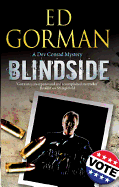
Ed Gorman. Severn, $28.95 (192p) ISBN 978-0-7278-8025-3
Shamus Award–winner Gorman's absorbing third mystery featuring Dev Conrad (after 2010's Stranglehold) finds the Illinois political consultant stepping into a congressional match between liberal incumbent Jeff Ward and Ward's blustery right-wing opponent, Rusty Burkhart. As a favor to Ward's father, Conrad agrees to spend a couple of days with Ward's campaign to try to discover a spy within the organization. Conrad doesn't like either of the candidates—Burkhart because of his stances and Ward because of his arrogance and tomcatting. When the shooting death of one of Ward's senior advisers threatens to derail the campaign, Conrad discovers that both candidates have secrets that might end their careers. After analyzing the good and the bad—mostly the bad—in current political campaigns, cynical, sharp-witted Conrad concludes, "We still had a country that we could be rightly proud of." Readers should take that message to heart as the 2012 election cycle heats up. Agent: Dominick Abel. (Feb.)
Reviewed on: 12/05/2011
-------------
The Ugly Truth About Consumer Book Reviews: Part One
Posted: 12/ 5/11 10:36 AM ET
For IndieReader, by Terri Giuliano Long:
Love it or hate it, this is an exciting time in the publishing world. Technological advances have made the long, arduous process of publishing a book cheap, easy and fast--giving voice to millions of new authors and providing readers with a richer, more interesting selection of books.
That's the good news. The challenge is, with so many new choices, how do readers determine which titles to pick?
With indie books, it can be especially hard. Only a handful of indie authors have been around long enough to have an identifiable "brand" (think James Patterson or Nora Roberts). To buy a book by an unfamiliar author, even if it costs only 99¢, readers must take a chance. This perception of risk is amplified by the stigma still associated with self-publishing. Complicating matters, traditional media rarely (if ever), review indie books, forcing readers to rely on consumer reviews--putting disproportionate authority into the hands of consumer reviewers.
Why is this bad? While the majority of consumer reviews are genuine and well-intended, anyone who has visited a review site like Trip Advisor or Yelp knows that they can also be unreliable and-- sometimes--downright dishonest. Some reviewers will lower a restaurant's rating because their server happened to be in a bad mood. Others fake their own glowing reviews or post reviews intended to damage a competitor's reputation. One popular up-and-coming restaurant received caustic reviews on Yelp--posted, it turned out, by a restaurant owner down the street, infuriated because he thought the new guy was "stealing" his business.
With the industry in tumult, publishing has become a free-for-all, akin to the Wild West. Eventually, a new hierarchy will emerge and rules will be set in place. In the meantime, the rules are ambiguous and loosely enforced. In a highly competitive environment, uncertainty and lax regulation offer people plenty of incentive to game the system
for the rest go here:
http://www.huffingtonpost.com/indiere...
Published on December 05, 2011 09:02
December 4, 2011
A disabled writer's book unfolds a tap at a time

Ed here: As many of you know Peter Winkler posts comments on a fair share of stories I run. I had no idea of the courage and determination it takes to do so. Let alone the courage and determination it takes him to write books. Here's his story from the LA Times.
A disabled writer's book unfolds a tap at a time
By Nita Lelyveld, Los Angeles Times
Peter Winkler, his body trapped by rheumatoid arthritis, wrote the first biography of Dennis Hopper to come out after the actor's death. Little did his agent know that he had to punch out the manuscript one letter at a time, using a red plastic chopstick.
Writer Peter Winkler works on his computer in his North Hollywood home. Winker, 55, has limited movement because of rheumatoid arthritis and suffers from other ailments. To write his biography of actor Dennis Hopper, he tapped out each letter using a long, red plastic chopstick. (Brian van der Brug / Los Angeles Times / November 2, 2011)
ALSO
Dennis Hopper dies at 74; actor directed counterculture classic 'Easy Rider'
Story of determination comes out of Afghanistan
Electrical stimulation creates images that could help blind see
By Nita Lelyveld, Los Angeles Times
December 3, 2011
Thanks to the conveniences of the wired world, Peter Winkler was able to write a book and find an agent and a publisher without ever having to leave his North Hollywood home.
Winkler raced to produce the first biography of Dennis Hopper to come out after the actor died in May 2010.
It was only when the book was on the shelves that his agent learned how he had done it.
"My God, I had no idea," said Robert Diforio of Weston, Conn., who sold "Dennis Hopper: The Wild Ride of a Hollywood Rebel" to a small East Coast publisher, Barricade Books.
In the virtual world, Winkler roams free. He blogs. He comments. He write articles about film.
In the physical world, he increasingly is trapped — dependent on his sister and a long, red plastic chopstick.
Rheumatoid arthritis has battered him for 46 of his 55 years.
His neck won't turn. His head is pitched down, chin to chest. His elbow and wrist joints are so fixed in place, he cannot touch his face.
Sitting up in bed, he can no longer extend his arms far enough to place his fingertips on the keyboard of the MacBook Pro propped on a lap desk across his thighs.
Instead, he braces the chopstick between several fingers on his right hand and uses it to tap, tap, tap one key after another.
It's not so bad, he says. He's gotten pretty fast, and anyway, "I was always a two-finger typist."
:Winkler never told his faraway agent about his stiff, bent fingers and locked joints, he says, because "frankly, it was not his business, it was not germane."
for the rest go here: http://www.latimes.com/news/local/la-...
Published on December 04, 2011 09:04
Ed Gorman's Blog
- Ed Gorman's profile
- 118 followers
Ed Gorman isn't a Goodreads Author
(yet),
but they
do have a blog,
so here are some recent posts imported from
their feed.



